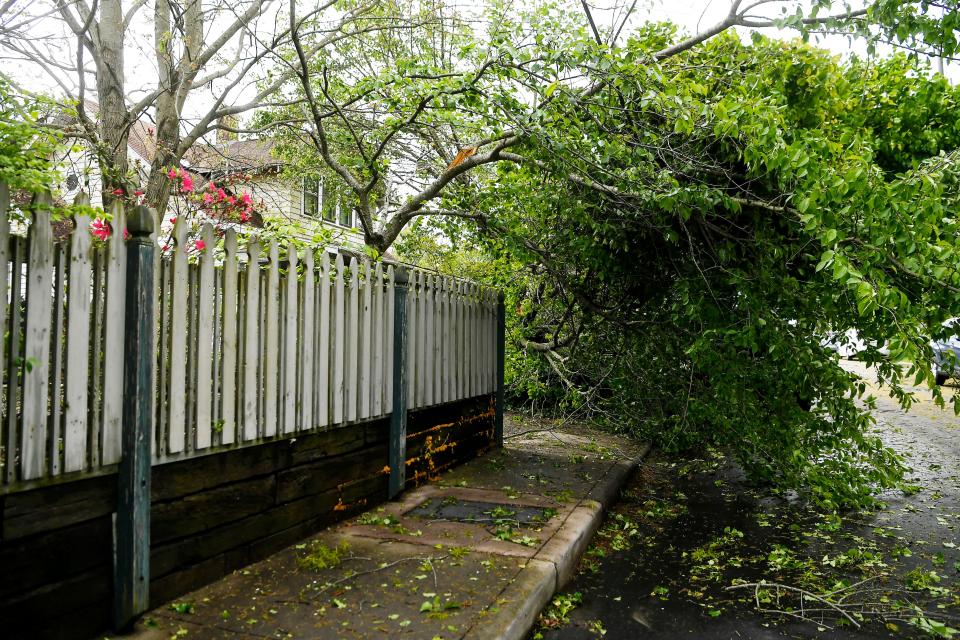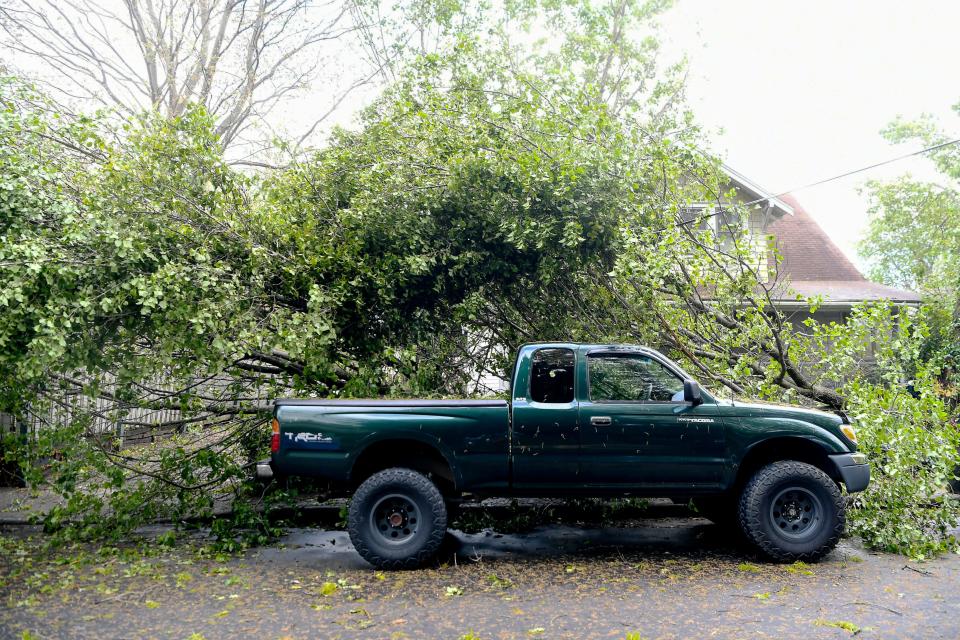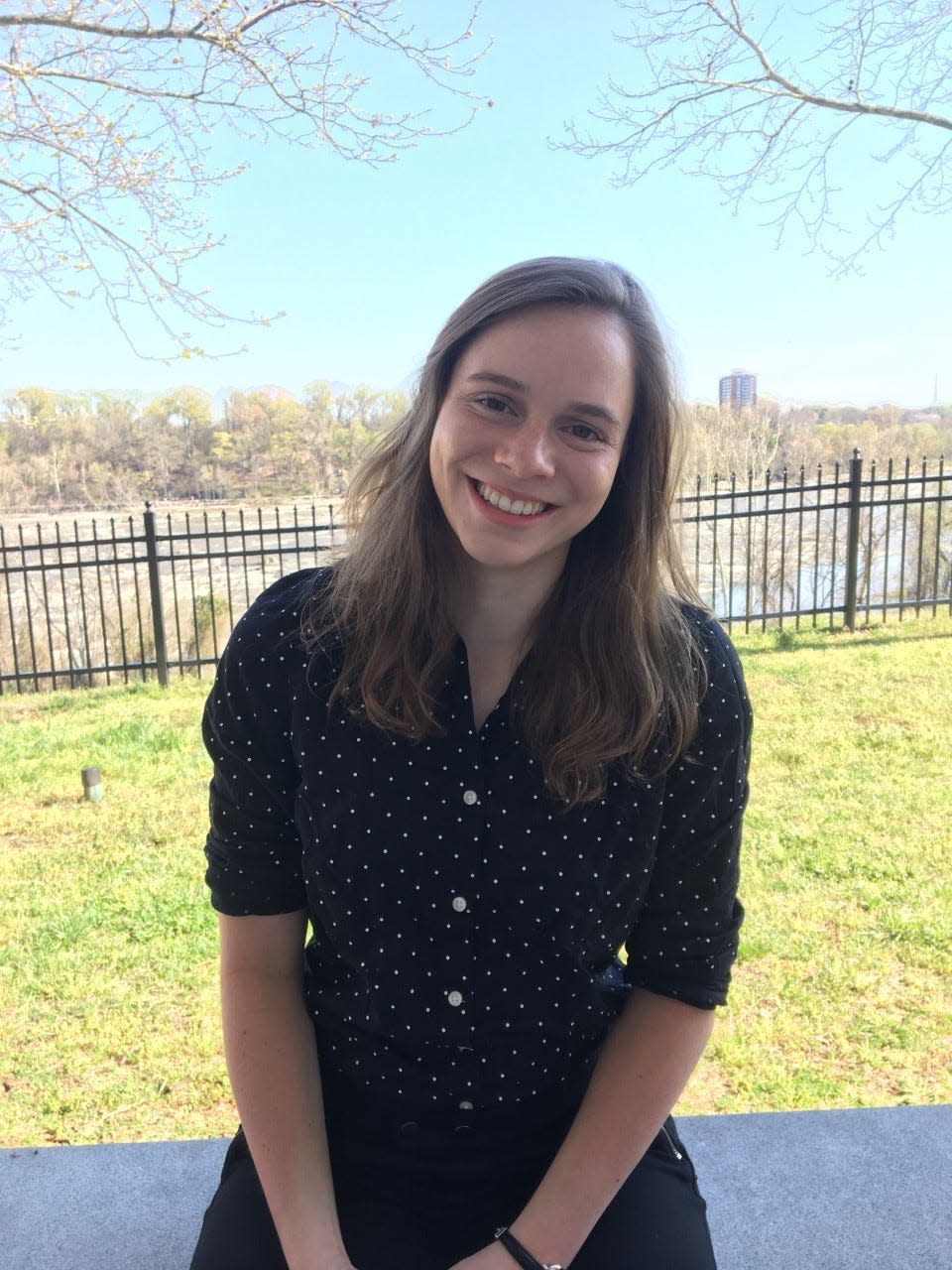Answer Woman: A tree falls in Asheville. Now who's responsible for the damage?
ASHEVILLE - Today's burning question is about the liability behind fallen trees: when it happens, who is responsible? Got a question for Answer Man or Answer Woman? Email Executive Editor Karen Chávez at KChavez@citizentimes.com and your question could appear in an upcoming column.
Question: There was a huge tree that fell across the street on Kimberly Avenue several weeks ago. It did major damage to the house across the street. These huge old trees line both sides of this street as well as many others. Who is responsible for the damage? The tree property owner, the property owner whose house was damaged or the city of Asheville? Is there any ordinance that requires removal of the debris?
Answer: In the case of this particular tree, it was a white pine that fell on March 1, city spokesperson Kim Miller said. It wasn't a city tree, the city is not responsible for damage to private property.
The Asheville Fire Department and public works crews were the first to respond, she said. AFD carried out structural and safety checks and took "appropriate measures" for the homeowner.

Kimberly Avenue is a city maintained street, so public works crews removed debris from the roadway to the right-of-way line, but are not allowed to enter a homeowner's private property to remove any portion of a tree or debris, she said. Homeowners are not charged for these cleanup efforts.
"The city's staff arborist (Mark Foster) took additional measures at the request of the homeowner to test a spruce tree in the right of way to determine if it posed an additional threat to the home," Miller said. "Drill site testing showed no signs of decay that could compromise the tree, and those results were shared with the homeowner."
But what if it was a city-owned tree?
There are thousands of public trees throughout the city — from roadside and park trees, to those along the greenway and in other city-owned spaces, such as Riverside Cemetery.
Currently, there's no comprehensive inventory of all city trees, but that could begin to change with the March 15 issuance of a request for proposals for an Urban Forest Master Plan, a $300,000 undertaking and an essential piece in developing a future urban forestry program.
The RFP calls for an inventory of up to 15,000 public trees to include data on species, diameter, risk rating and location.
The project is being led by Keith Aitken, the city's new-ish urban forester, who filled the position in March 2023.
It's intended to guide future policy and ultimately grow the city's urban tree canopy, creating a strategy for "sustainable management."
The plan will "set the stage" for future decisions, Aitken told the Citizen Times on April 3.
"I want to reach every single corner of Asheville that I can that is interested in the tree canopy and climate mitigation," he said.
The city does look out for high-risk trees in city rights-of-way, parks and other properties, Foster told the Citizen Times last year. The main focus are trees along city streets, aided by the work of parks maintenance staff and other departments.
"In general, if a city-owned tree falls onto private property, we complete an investigation just like an insurance company does," Miller told the Citizen Times. "If a live tree comes down generally there is no liability. If the tree is dead or diseased, the city would have responsibility only if we had knowledge and were unable to remove the tree before the tree came down and caused damage."
"Having knowledge," could mean it was identified by an Asheville crew, or a resident, property owner or anyone else reported a hazard to be inspected.
"Given the amount of trees throughout the city, we can't know about every situation; however, once we do, the 'knowledge' criteria comes into play for city-owned or city right-of-way trees," she said via email.

So who is liable when a tree falls on private property?
Who is liable for trees falling across property lines, particularly when it causes damage, is a question experts say varies on a case by case basis.
In an article written by Robert Branan, an N.C. State Extension agricultural and environmental law specialist, for the extension's website, he said, "as a practical matter, a homeowners or farm hazard policy should cover structural damage and removal costs from a tree or branch falling on the property though the tree is rooted across the property line."
It is not the policy-holder’s responsibility to establish fault, and money for the tree damage and removal should come from the policy, Branan wrote.
In the event liability does need to be assigned for a tree falling across a property line, the question relies on a number of factors.
"A person who is injured or suffers property damage due to the fall of a tree rooted on the adjoining tract must prove that the owner of the adjoining tract was negligent in permitting a dangerous tree to remain standing and poised for damage," Branan said.
"Under negligence theory, the landowner is under a duty to eliminate a reasonably foreseeable danger a tree may pose to adjoining property."
A similar question was tackled in another Citizen Times answer column several years ago. In it, John D. Noor, an attorney with Roberts & Stevens in Asheville, weighed in with his opinion, while noting any true "legal advice" would need to come from an attorney based on the specific situation. His first suggestion was to start by talking to your neighbor if you have a concern about a leaning tree.
"In the event that the tree falls, if it was diseased, the concerned property owner notified the neighbor of the problem, and the neighbor did nothing to address it, the concerned property owner would likely have a claim against the neighbor for the damage," Noor said. "However, generally speaking, if a healthy tree falls down in a storm or due to some other act of God, the owner of the tree is not responsible for the damages."
How to report a potentially hazardous tree for inspection? Use the Asheville App or call Public Works/Streets Division to report a tree concern: 828-259-5852.
More: Answer Woman: How big of a risk are falling trees in Asheville? City response to concerns?
More: Answer Man: Can I cut down my neighbor's leaning tree? Handicapped parking at AVL?
More: Meet Asheville's 1st urban forester. How will the city grow its tree canopy?

Sarah Honosky is the city government reporter for the Asheville Citizen Times, part of the USA TODAY Network. News Tips? Email shonosky@citizentimes.com or message on Twitter at @slhonosky. Please support local, daily journalism with a subscription to the Citizen Times.
This article originally appeared on Asheville Citizen Times: Answer Woman: Who's responsible for damage from fallen trees?

